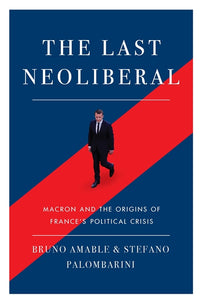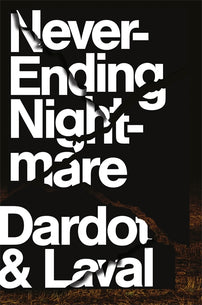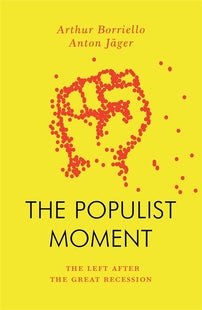We need to give people hope
In this interview, Ugo Palheta argues that the Left in France must both resist the threat of fascism and prepare a real alternative to Macronism in order to truly defeat the far right.

Ugo Palheta is a sociologist and expert on the far right and fascism. His important books on this topic include La Possibilité du fascisme (La Découverte) and Face à la menace fasciste, sortir de l'autoritarisme (with Ludivine Bantigny, published by Textuel). He also hosts a podcast whose title translates as “Midnight in the Century”. In an interview for Les Inrockuptibles, he urges us both to resist the fascist danger and to prepare a real alternative to Macronism.
This interview, conducted by Jean-Marie Durand, was originally published in French by Les Inrockuptibles.
For years, you have — if not exactly “prophesied” — at least hypothesised the return of fascism in France, including in your book La Possibilité du fascisme, first published in French in 2018. Were you surprised by the scale of the Rassemblement National’s victory on June 9?
Ugo Palheta: Not really. The polls had been predicting it for some weeks already, months even. But more than that, I’ve spent a lot of time over the last six or seven years emphasising the deep roots of the FN/RN vote. It’s not just a protest vote, it's not just a passing “fever”. It reflects underlying trends in French society and politics and — even more widely — in a capitalism in crisis. Finally, since the same causes produce the same effects, there was no reason why the continuation of Macron’s brutalisation of French society after the elections of 2022 wouldn’t keep on encouraging the growth of the far-right vote.
How do you interpret Macron's decision to call snap elections? Is it a sign of his inability to govern, of his political perversion, of his way of playing with fire, of normalising a far right that he has perhaps nurtured rather than fought?
A bit of all of that. I won’t go into the psychological aspects, which I have little interest in. But I think you’re right to mention those other factors. Firstly, in France, there is what Antonio Gramsci called a crisis of hegemony. This can be seen, in particular, in a crisis of party representation (decline of the major traditional parties, growing abstention), but also in a crisis of ideological apparatuses (the media and schools, in particular), and, more fundamentally, in a crisis of the ruling class's hegemonic project. Today there aren’t so many people who still take seriously neoliberalism’s promises of ever wider prosperity and personal emancipation.
As soon as he was elected — rather like François Hollande or Nicolas Sarkozy before him — Macron was unpopular and had to confront major social movements (the gilets jaunes, the movement against pension reform, the workers mobilising in the public health sector, etc.). And starting his second term [i.e. in 2022], he didn’t even get an absolute majority in the National Assembly — something no freshly elected president had ever failed to do, in the history of the Fifth Republic. As well as that, he constantly played a dangerous game with the far right, adopting its policy proposals (immigration laws, a “separatism” bill) and its words (“de-civilisation”, the “organic nation”, “demographic rearmament”), rehabilitating some of its figures (Charles Maurras, Philippe Pétain), or, for example, accepting an interview with the racist magazine Valeurs actuelles.
But, in the last analysis, his decision is a gamble that’s none too likely to pay off. If he was counting on divisions on the left to give him an absolute majority in a head-to-head with the Rassemblement National, it looks like that plan has failed, given the agreement between La France Insoumise, the Socialists, Greens and Communists. If he’s counting on the Rassemblement National crumbling, if it does govern France over the next three years, that’s a despicable calculation that’s likely to be proven false, looking at what we’ve seen in other countries.
[book-strip index="1"]
What are the more underlying forces that have allowed for this return of the far right in France, these last few years?
It’s quite a simple cocktail, and essentially consists of four elements. Firstly, policies pushing social regression and competition, which correspond to what is generally called “neoliberalism” (think of the pension and unemployment insurance reforms). This produces a rise in various types of insecurity across society, and above all a generalised fear of becoming déclassé: losing one’s existing social position. Secondly, a reactionary politicisation of issues of immigration, Islam and insecurity, cast in a xenophobic, racist and authoritarian key. On that point, I need only mention the immigration law passed in December thanks to the votes of the FN/RN. Then there is the constant normalisation of far-right rhetoric in politics and the media. Finally, an all-out offensive against the left (and in particular against its dominant force, since the various elections in spring-summer 2022, namely France Insoumise), which has had the effect of legitimising the FN/RN as the main, responsible opposition. If you shake up these various elements, in an old imperial power in decline like France, you get a far right at 40 percent.
How has Emmanuel Macron's “authoritarian neoliberalism” played into this rising fascist temptation?
When it is endlessly repeated that there is simply no alternative to the market, competition, and job insecurity (renamed “flexibility”), etc., and when all the social movements who challenge this neoliberal regression are trampled upon — including by ever more violent means — this has its effect on part of the working and middle classes. That is, it builds up the feeling that the only way to improve their lives is not to take on the propertied classes or capital, but those who are below them or who ought to remain below them, i.e. racial minorities and immigrants, who are moreover over-represented in the most exploited and poorest sectors of the population.
In reality, the far right promises little or nothing on the economic and social front. It, too, believes that there is no alternative to neoliberal capitalism. But to win these people over, it relies on a racial pact, and promises, more forcefully than the other parties, to ensure that this pact will hold: you, the “real French”, must remain “masters in your own house”, i.e. stay on top, continue to get ahead, etc. And then there’s another very simple mechanism, in terms of the authoritarian dimension: when you issue all sorts of laws and rhetoric about security, you implicitly favour the far right, by lending credence to the very solutions that it has always proposed. Just like with racism. In the words of Jean-Marie Le Pen: “In the end, the voters will prefer the original to the copy”.
[book-strip index="2"]
Many observers of French political life and history have long insisted that our country was “allergic” to fascism. Were they wrong?
Of course, this idea of an “allergy” has always had more to do with national-republican mythology than with any historical reality. Moreover, no one really still defends this idea in this caricatural form. And that’s not to mention the intellectual origins of fascism, which the historian Zeev Sternhell convincingly showed are at least partly French (even if he surely tended to bend the stick in the other direction, by underplaying its other sources). The interwar period saw the emergence of several significant, even mass, movements in France which bore more than a passing resemblance to fascism (particularly Italian fascism), in particular, the Parti Populaire français, the Jeunesses Patriotes, the Chemise vertes, and, of course, the Croix-de-Feu and Action Française (although the latter had a fairly specific ideology).
It is laughable that some historians say that French fascism lacked an imperialist dimension. It was precisely because France already had a vast colonial empire (unlike Germany and Italy, countries frustrated in their colonial ambitions) that it had no need to take on this aggressively imperialist dimension. And, while the Vichy regime was installed in the wake of a military defeat, and so lacked the triumphalist dimension of Italian or German fascism, it was also the product of a longer-running turn among French elites, a determination to bring the Left and the working class to heel, and the strength of nationalist movements (a cocktail that can be found in fascism more widely).
Do you think that the Left needs to invent a new anti-fascism? On what basis — and what rules should it set itself.
We have an urgent task ahead of us, and it’s not just a case of anti-fascism. If the Left goes no further than anti-fascism, then it will end up heavily defeated. We need to both repel the fascist threat and prepare an alternative to Macronism: not just point out the danger but create hope for change. Serious anti-fascism demands a longer-term effort, which, first of all, means getting rid of a superficial and instrumental anti-fascism — the kind we see on election nights and calls for a common front in run-off votes. I’m not saying that we shouldn’t think about second-round choices. But this is probably the worst way of posing the question of anti-fascism.
If the aim of this movement is to roll back — and ultimately politically eliminate — the far right, we need to start by recreating an anti-fascist political culture that fits the times we live in. That means a culture that can no longer rely solely or mainly on taking the resistance to Nazism as its compass. For many young people, that’s a page in the history books. Of course, we can and must pass on the history of fascism and anti-fascism, understand the roots of the far-right vote, decipher neofascist strategies and so on. These are the things I try to do in my podcast "Minuit dans le siècle". But, starting from the fight against the far right, we also need to re-politicise the society around us, and to link anti-fascism with all the movements for liberation: trade unionism, feminism, the fight against racism, for ecology, etc.
[book-strip index="3"]
Do you think the Left is capable of uniting, despite its internal divisions?
Unity is never a given: it’s a struggle, in both senses of the word. Unity has to be won, against the tendency for each organisation to look after its own interest alone. That’s not just an issue of political parties: the unions, associations and collectives also have a major role to play in unity if we want to win. But we also need to achieve a unity that is not just a lowest-common denominator. It has to be based on breaking with this society of competition, inequality and alienation, which so many people no longer want.
We saw with the terrible experience of Hollande’s presidency (2012-17) that if we repeat the dismal record of left-wing betrayal, and if we give up on transforming society in the direction of equality and social justice, then we will inevitably encourage the rise of far-right forces and even offer them an open goal. So, the stakes could barely be higher. It’s not just about unity but using that unity to win a majority in the country and show that we can change society and transform our lives. After all, the far right is the party of despair. So, we need to give people hope.
Translated by David Broder


